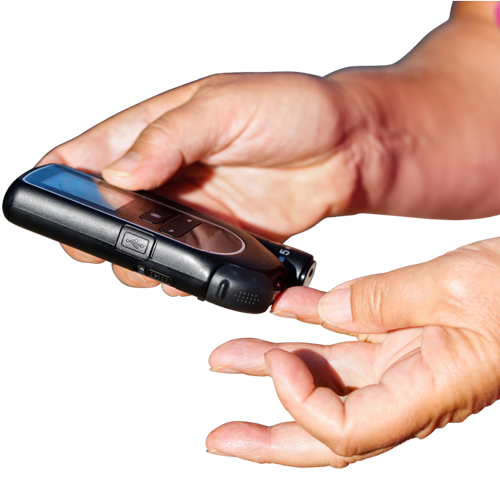Blood glucose monitoring is an element of diabetes management. Here is what you need to know to obtain an accurate reading.
Blood glucose monitoring
When speaking of diabetes, the use of a blood glucose meter is inevitably referenced. This small electronic device enables blood glucose (level of sugar in the blood) monitoring at home. If you have to monitor your blood glucose, it is essential to use a device that is suited to you and that is easy to understand. To learn about the different available options, speak to your pharmacist, who can help you choose the device best-suited to your needs.
The pharmacist or healthcare professional who monitors your diabetes can also tell you how often to check your blood glucose.
What is coding?
Coding, calibration or code entry, are synonyms that refer to an electronic adjustment made to a blood glucose meter that takes into account the variations of reactive strip lots. This step must be performed prior to the test that is needed to obtain reliable results. Most devices currently available on the market have automatic coding and do not require that the patient insert a chip or a code when they purchase a new box of reactive strips. This is good news, since this step led to mistakes for many users. If your device requires coding (inserting a chip of entering a code), this may mean that it is not a recent model. Ask the pharmacist if they think you should purchase a new meter.
Why do I have to monitor my blood glucose if I get blood tests to check my diabetes?
At the doctor’s or pharmacist’s request, a person with diabetes has to have a blood test called glycated hemoglobin (or HbA1c), generally every three months. This test allows for an assessment of the average blood glucose level over the last three months. Although this test is very important, it does not ensure diabetes management on its own. Self-monitoring blood glucose at home is also essential.
Continuous monitoring of blood glucose makes it easier to adjust medication. It helps to confirm that the result of the HbA1c reading is reliable. This ensures that diabetes is well controlled, which is crucial, since the reverse can generate negative consequences on health.
Monitoring blood glucose also ensures that levels do not go below 4 mmol/l (hypoglycemia), and helps to correct and maintain levels to avoid a potential hypoglycemic episode. Additionally, monitoring makes you more aware of the benefits of a healthy diet and exercise on blood glucose levels. In doing so, you will be more inclined to make lifestyle changes and to take your medication regularly.
How can I ensure that my blood glucose meter is reliable?
In order to ensure that the blood glucose readings obtained are reliable, it is necessary to have your device checked. To do this, you must compare the readings obtained with those done at the hospital laboratory. You need a prescription requesting that your device be validated. It is necessary to have the device checked when it is purchased, even if it is new. Therefore, it’s important to let the professionals who monitor your diabetes know as soon as you purchase your new device. Additionally, it is recommended to have the device validated at least once a year. If you can't remember when your device was last validated, ask the healthcare professional who monitors your diabetes to find out for you. You may also be asked to have the device validated again if the blood glucose results are not consistent with your HbA1c.
To verify a blood glucose meter, it is necessary to test blood glucose at the hospital and using your own meter after fasting for eight hours. Any variation of 15% or less between the readings by your device and the ones obtained at the hospital laboratory is considered to be valid. If there is a variance of more than 15%, your device will have to be replaced by a new one, and you will have to repeat the validation.
Speak to your pharmacist if you have any questions about how to measure blood glucose or about meters. Your pharmacist can help you.


